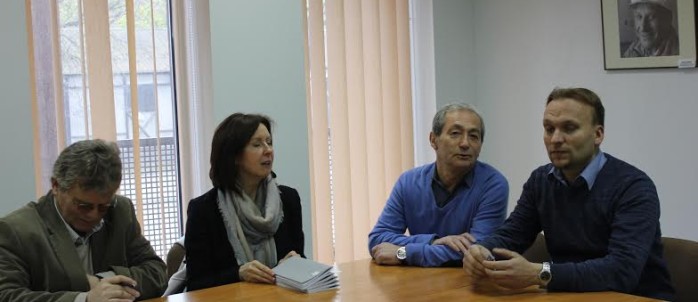
The White Rose was the only organized youth resistance group at universities in Nazi Germany (the Edelweiss Pirates and the Swingjugend weren’t specifically university groups and weren’t as organized), established by students and a professor in Munich in June of 1942. Gradually the White Rose movement has come to symbolize all German resistance to Naziism, although it is still not widely known outside Germany.
In their final leaflet distributed in February of 1943, the White Rose society wrote:
“Der deutsche Name bleibt für immer geschändet, wenn nicht die deutsche Jugend endlich aufsteht, rächt und sühnt zugleich, ihre Peiniger zerschmettert und ein neues geistiges Europa aufrichtet. Studentinnen! Studenten! Auf uns sieht das deutsche Volk!”
[The German name will be dishonored forever if the German youth do not finally rise up, take revenge, and atone, smash their tormentors, and establish a new Europe of the spirit. Students! Students! The German people look to us!]
The Allies made use of the group’s existence and their leaflets to encourage the German people to rise up against Hitler. The leaders were rounded up by the Nazi regime, tried in the Nazis’ “People’s Court” and sentenced to death. Several were beheaded. The Nazis then charged the widow of one execution victim 600 reichmarks for the cost of beheading him. Others received long prison terms.
After the war few source documents about the group were available in the West. The Soviet Union did collect a lot of the trial material and passed it to the East German authorities after that state was officially declared. It went to the Federal Archive of Germany in Berlin after East and West Germany merged in 1989, and was then published.
Now two honored guests have visited the Kaunas Jewish Community to talk about opening an exhibit about the White Rose in Kaunas.
Dr. Werner Rechman, coordinator of the Friedrich Ebert Foundation for the Baltic states, and Jolanta Steikūnaitė-Babarskė, the director of the Lithuanian office of the foundation, met with Kaunas Jewish Community chairman Gercas Žakas and Dainius Babilas, who is the director of the Kaunas Multicultural Center, to talk about the foundation’s exhibit and to discuss more generally tolerance in Lithuanian society and public perceptions of the Holocaust and Lithuanian Nazi collaboration. The exhibit is to open in Kaunas on July 5 at 6:00 P.M. at the Kaunas Multicultural Center located at Šv. Gertūdos (St. Gertrude’s) street no. 58 in Kaunas.

